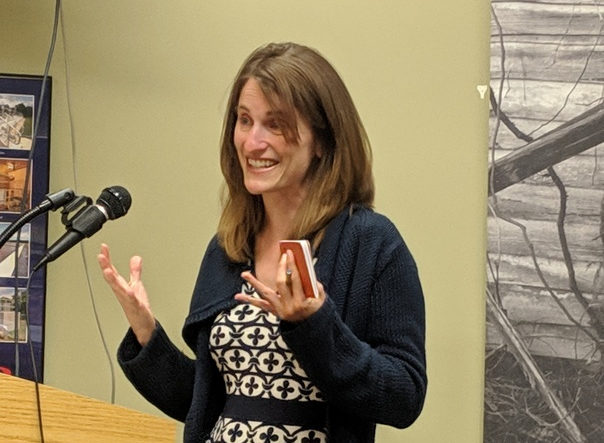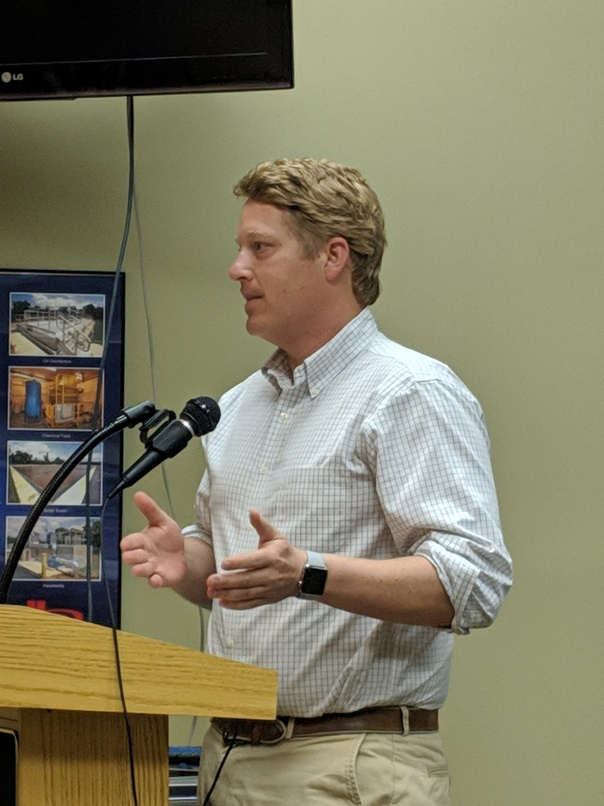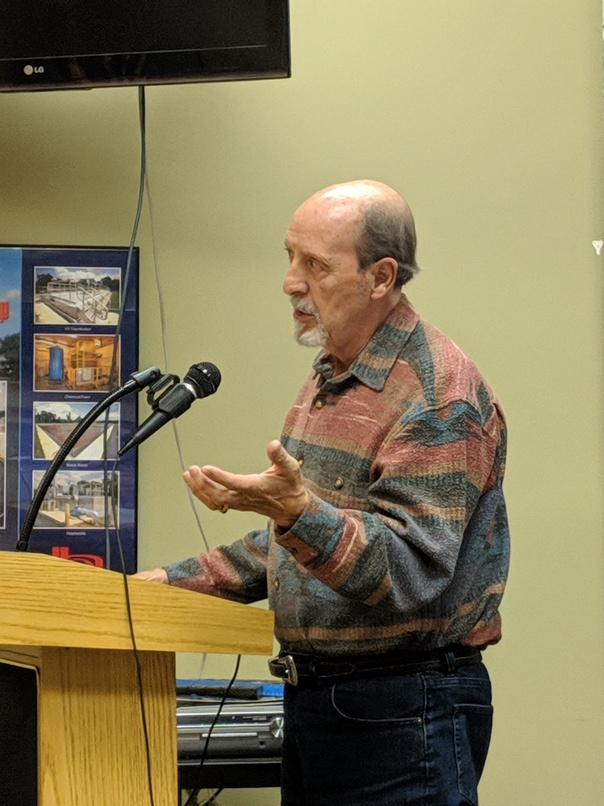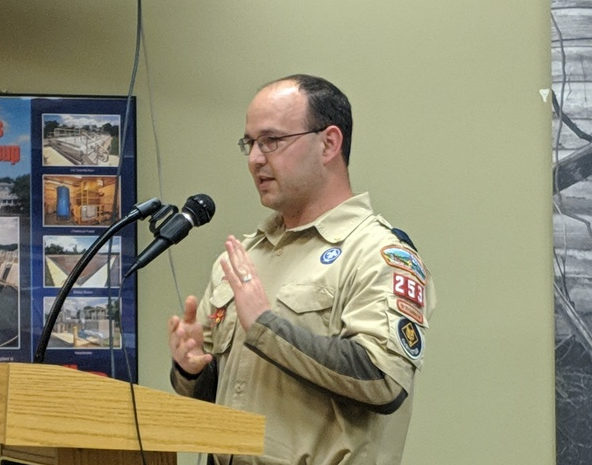
Darren Tilghman of the Chestertown Environmental Committee
The Chestertown council, at its April 15 meeting, heard an update from the town’s Environmental Committee. Several committee members helped deliver the report, which covered a wide range of activities. Committee member David Sobers handed the agenda to the council and introduced several members for specific sections of the report.

Chester Riverkeeper Tim Trumbauer
Tim Trumbauer, the Chester Riverkeeper, reported on activities in the town’s Third Ward, including plans to renovate Louisa Carpenter Park in the Washington Park neighborhood. He said Councilman Ellsworth Tolliver, in whose ward the park is located, had been working with the committee on the project. Trumbauer said the town had issued a Request for Proposals and accepted a bid from David A. Bramble to perform the renovations. He said the contractor had agreed to meet with Tolliver at the park to update him on the project and to address any concerns.
Town Manager Bill Ingersoll said he believed there was a storm drain at the park buried under more recent construction. He asked if Trumbauer had any information on that. Trumbauer said he had heard there might be such a drain from some 30 years ago, but that it was apparently no longer working. He said the main issue with the park right now was that the contractor had agreed to a specific scope of services, which the committee would talk to them about to see whether it could include working on the drainage. He said there was also a rain garden installed a number of years ago that received water draining from the road, but it was no longer functional.
Also, Trumbauer said that Tolliver had agreed to help the committee find a representative of the Third Ward, so the committee has representatives from each of the town’s four wards. Finally, he said, the committee has adopted membership rules to put itself on a more formal basis than heretofore.
Donald Small, of the Washington College Center for Environment and Society, reported on plans to address compacting issues in the soil at Fountain Park. He said he had exchanged emails with farmers market manager Sabine Harvey to let her know that the Environmental Committee is available to help with suggestions, brainstorming or grant writing. Small said that Harvey is also working with the Chestertown Garden Club, which maintains plantings in the park. He said he hoped the team would have more information in the near future.

Carl Gallegos of the Chestertown Environmental Committee’s tree group
Carl Gallegos, representing the Environmental Committee’s tree group, reported on plans to work with the College’s GIS Center to update its images of the town’s tree cover, determining what percentage of the town is currently covered. He said this would be a step toward assessing where trees need to be planted to reach the committee’s recommended level of 40% tree coverage within the town. He said the committee’s plan was to plant trees of at least 2-inch diameter, doing so over the winter to maximize their chance of survival.
Darren Tilghman gave an update on the town’s project of installing a riverfront walkway downriver from Wilmer Park, through lands now owned by Washington College. She said the main requirement for the project to move forward was “a champion inside the college,” which Greg Farley agreed to take on. She said Farley met with college officials and had reached verbal agreement to move forward with the trail, in partnership with the Eastern Shore Land Conservancy. “For the Environmental Committee, that is really important. It’s an access issue; we want people not to have to own riverfront property in order to be able to enjoy this river,” she said. She said it was also an economic development issue.
Mayor Chris Cerino asked to what extent the college was on board with the rail trail, for example, whether it was committed to giving the town an easement for a trail. He noted that the college is in the process of selling off excess property, potentially including the armory, so it would be a good idea to get the agreement in place before that property is sold. Tilghman said Farley was working on that end of the project, but she didn’t know whether there had been any specific commitments on the college’s end.
Town Manager Bill Ingersoll said the decision on an easement needed to go before the college’s Board of Visitors and Governors. He said the town had offered as a model an easement given for use of the ground in front of the Custom House for a riverfront walkway between High and Cannon streets. He said the town didn’t expect to get a lot of money from the college, but that it hoped the college would put its planners to work on carving out pathways for the proposed trails, based on the work of the town’s planning commission at the time the college’s new waterfront buildings were approved. He said the next step ought to be a meeting of the committee, the town officials, and the college to work out details.
Tolliver also asked Tilghman for an update on the garden club project at Garnet School. She said the Garnet Good Seeds Garden project is “very close to fully funded,” with a community launch event tentatively planned for May. She said there had been an “amazing” outpouring of support from community businesses, and that work would begin in the summer.
Councilman Marty Stetson asked whether there was a problem with constructing a walking trail over wetlands along the river. Ingersoll said the decision had been made not to extend the trail along Radcliffe Creek, but to end it at the old sewer plant just past the armory. He said the expense of constructing a trail through wetlands was more an issue than any environmental questions.
Tilghman said her group also looked into playgrounds and parks, as a way to get people outside. She said she had worked to activate a group of residents to work toward a grant to raise funds for playgrounds, including one at Garnet Elementary School. She said she was also working toward possibly extending the town’s rail trail.
Also, Tilghman said, the committee had learned that Chestertown is certified as a “Keep America Beautiful” town. She said that if the town can track how much trash is cleaned up from the rail trail, it would help the town keep its certification. Finally, she said the committee would have a presence at the town’s Earth Day festival, April 20, and would be distributing sustainability tip sheets to give residents specific ways to contribute to improving the environment.

Joe Bohle, leader of Cub Scout Pack 253
Also at the meeting, Joe Bohle, leader of Cub Scout Pack #253, asked the council’s permission for his pack to adopt a section of the Gilchrest Rail Trail as a cleanup project. The section chosen is the one running from High Street to the Morgnec Road bypass, through the Washington College campus, and the scouts would perform the cleanups on a Saturday, roughly every three months. Town Manager Bill Ingersoll said the town would supply trash bags for the cleanup, and would pick up the filled bags.
In his regular report, Ingersoll also outlined the schedule for the town’s budget discussions, which he would begin with a “very preliminary” meeting April 23. Worship sessions would take place on May 7 and 14, with the budget resolution to be formally introduced at the May 20 council meetings. “As usual, the budget looks like it’s going to be challenging,” he said. He noted that the town was approaching the county commissioners for a tax differential or a rebate to offset town residents’ taxes for services for which the county bills them but which are provided by the town, such police protection, water and sewer, planning and zoning, and so forth. Cerino said he thought the commissioners were more likely to offer a tax differential, which would benefit property owners in town but would not add anything directly to the town’s budget.



Write a Letter to the Editor on this Article
We encourage readers to offer their point of view on this article by submitting the following form. Editing is sometimes necessary and is done at the discretion of the editorial staff.